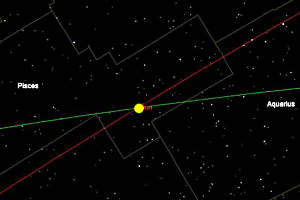 The Vernal Equinox, where the Sun crosses the Celestial
The Vernal Equinox, where the Sun crosses the Celestial
Equator (red line) on the first day of Spring (March 20/21).
Credit: Space.com/Starry Night
"Can you tell me about the upcoming beginning of the Age of Aquarius?" said the voice on the phone. "I heard that it starts this Saturday..."
Now, I get a lot of phone calls and emails from people with astronomy and sky related questions. Very often it's something like, "What was that thing that tried to land in my front yard yesterday evening?!" or, "Is it true that Mars will be closer to the Earth this weekend than it has been in a gazillion years?" I've even had one or two asking if it's true that the world is ending in 2012.
Okay, I'm embellishing a bit. Those are all very good questions, and I do my best to provide a science-based answer -- like, "Venus tried to land in your yard," or "The Mars extra-close encounter happened in 2003... and it had only been less than a century since the previous time," or, "We'll just have to wait for 2012 to roll around to find out..."
As for the Age of Aquarius question, that got me to wondering. I've always regarded this issue as astrology-related more than astronomy, but I also realized there are physical underpinnings to the definition. So I fired up Google and clarified some of the details for myself. The first thing I learned is that, among astrologers at least, there is little agreement on precisely when the Age of Aquarius is supposed to begin (or if it's already begun). Different astrologers at different times and from different parts of the world have tried to define this, resulting in multiple schools of thought on the subject.
